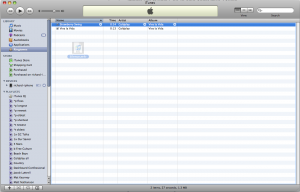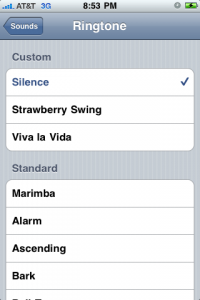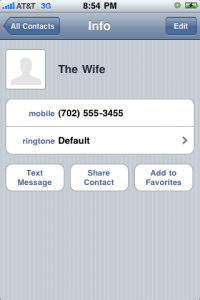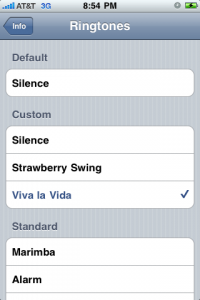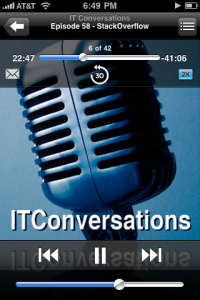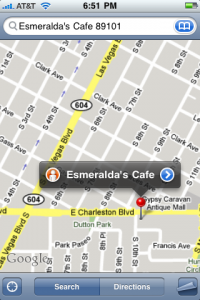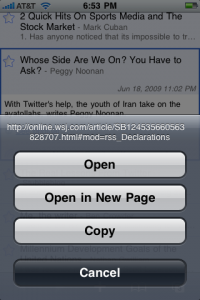I was asked to speak in church a few months ago and spoke on the topic of attention and distraction. Here’s the outline of my talk, delivered Aug 28, 2011 in Boulder, CO. By the way, I consider this a very positive topic — the opportunity to direct our attention and feel more peace and flow — not a negative topic about simply avoiding the “perils” of distraction.
Define attention: “your treasure”
You have a limited amount of time. You have even less attention because attention is the subset of your time during which you’re awake, alert, and have energy. Therefore, attention is more valuable than time. How you spend your attention constitutes what is important to you.
“For where your treasure is, there will your heart be also” (3 Ne 13:21)
- Where does your attention go?
- Which people get your attention?
- Which projects and causes and acts of service get your attention?
(The week after I presented this talk, Jason Fried wrote a great post on this concept: “Your Attention Please”.)
Technology can be a source of distraction
NYT Article: “Keep Your Thumbs Still When I’m Talking to You”
- Story of people at dinner at tech conference.
- Putting away your phone was like holding your breath.
- Once one person caved to distraction, all caved.
- “Mutually assured distraction”
WSJ Article: “When Twittering Gets in the Way of Real Life”
- “Sometimes, it’s like you’re here and you’re not here,” Joe said to me. “Your mind and soul are in cyberspace, and all we’re left with is the husk.”
- “Sometimes, I mindlessly find myself logging on to Facebook and staring at photos I have posted of my children when I just as easily could be staring at the real thing. I’m not proud to admit that.”
- “It’s incumbent upon me to find a way to consume less — and, more importantly, let it consume less of me.”
What we consume consumes us.
David A. Bednar: “Things As They Really Are”
“Please be careful of becoming so immersed and engrossed in pixels, texting, ear buds, twittering, online social networking, and potentially addictive uses of media and the Internet that you fail to recognize the importance of your physical body and miss the richness of person-to-person communication. Beware of digital displays and data in many forms of computer-mediated interaction that can displace the full range of physical capacity and experience.”
We’re here on earth to have a mortal experience with a body, with presence, with real people.
Distraction is the enemy of attention
- “I am persuaded that two of the greatest sins of our busy and hectic generation are distraction and preoccupation.” (David A. Bednar)
- “We need to frustrate…distraction by identifying what is critically important in our lives. We must give the cream of our effort to accomplish those things. Where there is limited time or resources, this pattern may require that some good activities be…set aside.” (Richard G. Scott)
- “Does the use of various technologies and media invite or impede the constant companionship of the Holy Ghost in your life?” (David A. Bednar)
- “Each of us should be careful that the current flood of information does not occupy our time so completely that we cannot focus on and hear and heed the still, small voice that is available to guide each of us with our own challenges today.” (Dallin H. Oaks)
When we allow some moments of our life to be quiet, peaceful moments, God can speak to our hearts through the Holy Spirit. My prayers are best when I take more time to listen in between what I say. I sometimes feel prompted to pray for something I hadn’t previously considered. We might pray for A, B, C. God may actually want to give us B, C, D, E, F, G, H. If we don’t listen, we may miss those extra things He wants to give.
Dallin H. Oaks: Focus and Priorities
We have thousands of times more available information than Thomas Jefferson or Abraham Lincoln. Yet which of us would think ourselves a thousand times more educated or more serviceable to our fellowmen than they? The sublime quality of what these two men gave to us–including the Declaration of Independence and the Gettysburg Address–was not attributable to their great resources of information, for their libraries were comparatively small by our standards. Theirs was the wise and inspired use of a limited amount of information.
The truck story, ibid.:
Two men formed a partnership. They built a small shed beside a busy road. They obtained a truck and drove it to a farmer’s field, where they purchased a truckload of melons for a dollar a melon. They drove the loaded truck to their shed by the road, where they sold their melons for a dollar a melon. They drove back to the farmer’s field and bought another truckload of melons for a dollar a melon. Transporting them to the roadside, they again sold them for a dollar a melon. As they drove back toward the farmer’s field to get another load, one partner said to the other, “We’re not making much money on this business, are we?” “No, we’re not,” his partner replied. “Do you think we need a bigger truck?”
We don’t need a bigger truckload of information, either. Like the two partners in my story, our biggest need is a clearer focus on how we should value and use what we already have.
Because of modern technology, the contents of huge libraries and other data resources are at the fingertips of many of us. Some choose to spend countless hours in unfocused surfing the Internet, watching trivial television, or scanning other avalanches of information. But to what purpose? Those who engage in such activities are like the two partners in my story, hurrying to and fro, hauling more and more but failing to grasp the essential truth that we cannot make a profit from our efforts until we understand the true value of what is already within our grasp.

